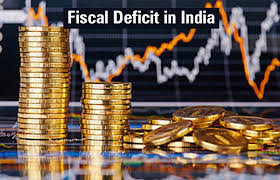As per a report by global financial services major UBS, Indian government is on track to achieving the fiscal deficit target of 3.2% of Gross Domestic Product (GDP) in the current fiscal year.
Fiscal Deficit:
A fiscal deficit occurs when a government’s total expenditures exceed the revenue that it generates, excluding money from borrowings.
- Fiscal Deficitdiffers from debt, which is an accumulation of yearly deficits.
- Thus fiscal deficit is an indication of the total borrowings needed by the government.
Highlight of UBS Report:
Indian Government’s fiscal deficit narrowed from a peak of 6.5 per cent of GDP in 2009-10 (after the global financial meltdown) to 5 per cent of GDP in 2016-17 and is estimated to fall further to 3.2 per cent of GDP in 2017-18.
- However, the states’ fiscal position remains stretched, with the fiscal deficit rising from a low of 1.9 per cent of GDP in 2011-12 to 3 per cent of GDP in 2016-17.

- The report outlined that hat while the pursuit of structural reforms, including a goods and services tax, bodes well for India’s sovereign rating (currently at the lowest investment grade), the risk of a worsening consolidated (centre and state combined) fiscal position may act as a deterrent.
- UBS said fiscal slippage due to an increase in populist spending by the government (including farm loan waivers announced by a few states) in the run up to the 2019 general elections remains a key risk for the government’s fiscal deficit position.
About UBS:
- UBS AG is a Swiss global financial services company, incorporated in the Canton of Zurich, and co-headquartered in Zürich and Basel.
- It was founded in year 1862.
- Axel Weber is the current Chairman and Sergio P. Ermotti is the current CEO of UBS.
AffairsCloud Recommends Oliveboard Mock Test
AffairsCloud Ebook - Support Us to Grow
Govt Jobs by Category
Bank Jobs Notification





